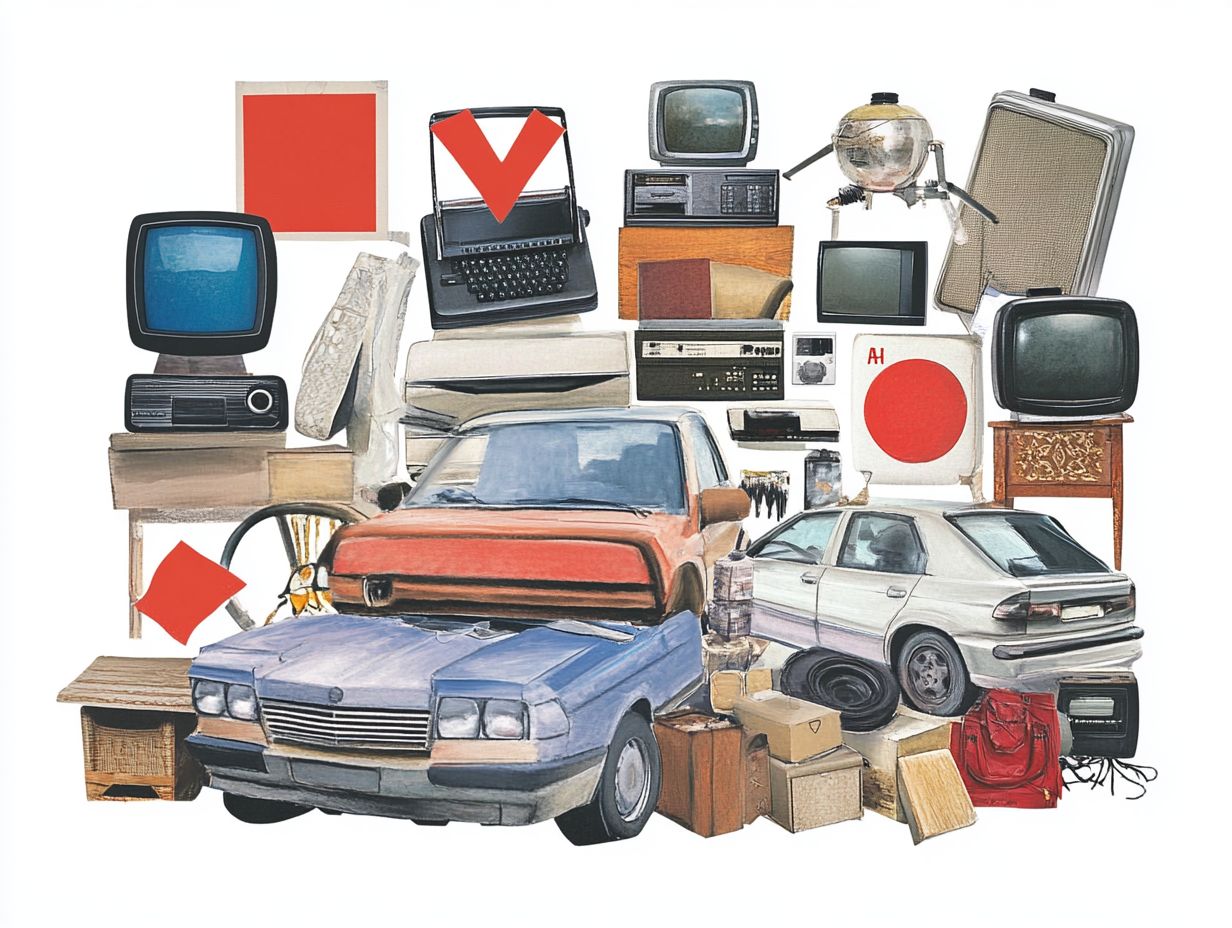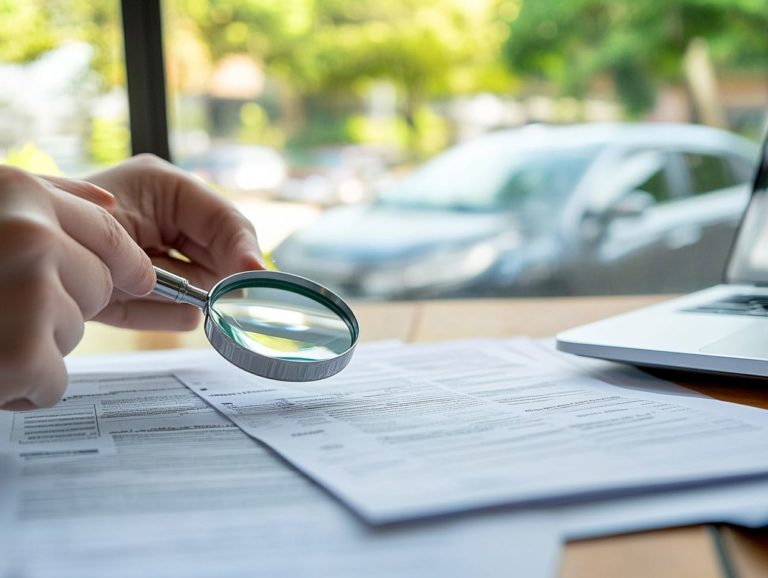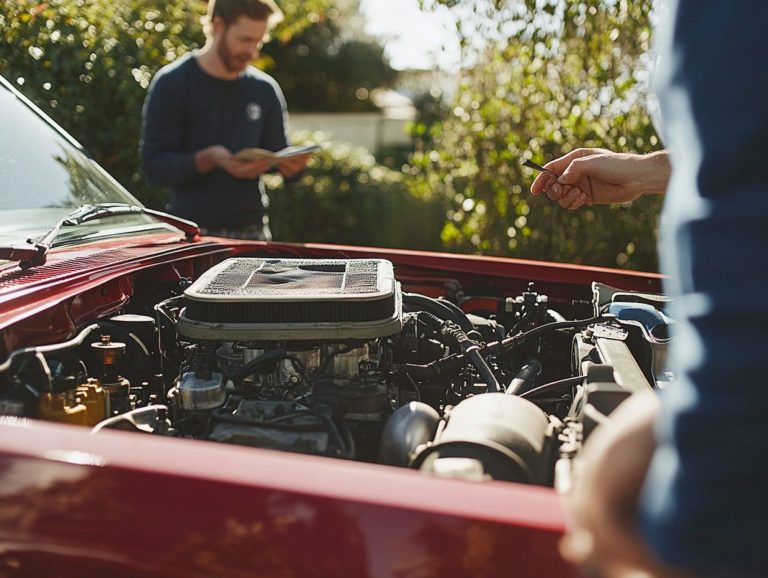5 Red Flags to Avoid When Buying Used
When you’re shopping for a used vehicle, it’s easy to get caught up in the thrill of scoring a fantastic deal. However, not all offers are created equal. Be aware of certain red flags that can signal trouble, whether it s a seller with a questionable reputation or a vehicle with a troubling history.
This article delves into five crucial warning signs to keep an eye out for, along with insights on the perks of buying used, essential considerations, and common pitfalls to avoid.
Whether you’re purchasing from a private seller or a dealership, knowing what to look for will help ensure you drive away in a reliable and safe vehicle.
Contents
Key Takeaways:

Do your research on the seller’s reputation before buying a used vehicle.
Always ask for the vehicle’s history to avoid any potential issues.
Beware of vehicles with a salvage title, as they may have hidden damage.
1. The Seller Has a Bad Reputation
When you’re considering the purchase of a used car, one of the most crucial factors to evaluate is the seller’s reputation. Negative reviews and complaints can be red flags, hinting at potential issues that might crop up during and after the sale, including the dreaded insurance fraud that could jeopardize your investment.
It s essential to dig into resources like the Better Business Bureau and consumer reports; these tools are invaluable for assessing a seller’s reliability. The experiences of previous buyers, showcased in testimonials and consumer reviews, can offer insights into the buying process and alert you to any red flags you should watch out for.
Be aware of the scams that can lurk in the used car market, as these can lead to significant financial loss. Expert opinions, especially from industry insiders such as Manuel Carrillo III, can clarify what to look out for, providing you with peace of mind as you navigate your purchase.
2. The Seller Is Not Willing to Provide Vehicle History
A seller’s hesitation to provide a detailed vehicle history report should raise immediate concerns. Getting this important information often at your fingertips through resources like Carfax, AutoCheck, or the NICB database can help you unveil hidden issues that may influence your purchasing decision.
It s crucial for you to grasp the components of the report. This typically outlines the service history, details past repairs, and highlights any instances of flood damage that could significantly undermine the vehicle’s integrity. The Vehicle Identification Number (VIN) is a unique code to identify your vehicle, allowing you to track its data from production to its current condition.
A comprehensive report sheds light on the vehicle’s past. Reaching out to industry experts like David Glawe, alongside an automotive historian, can provide you with invaluable insights into the vehicle’s reliability and overall market value. This thorough approach helps you catch red flags before they become costly mistakes!
3. The Vehicle Has a Salvage Title
Purchasing a vehicle with a salvage title can open the door to a host of hidden challenges. These vehicles are often labeled as ‘totaled’ by insurance companies due to significant prior damage, including flood damage, which can lead to costly maintenance issues and unforeseen problems later on.
The implications of a salvage title are extensive, indicating that the vehicle has likely undergone substantial repairs that could impact its safety and reliability. As a buyer, you must exercise caution. The market value of a salvage title vehicle is considerably lower than that of a clean title vehicle, reflecting its troubled history.
It’s essential to conduct a meticulous inspection to uncover any underlying issues that might not be immediately visible. Understanding the vehicle’s repair history is crucial, as it can influence future insurance claims and coverage options. Insurers may be reluctant to offer comprehensive policies for vehicles with salvage titles, which could hinder your ability to fully protect your investment.
4. The Vehicle Has High Mileage

A used car with high mileage might catch your eye as a great deal. However, it often comes with hidden surprises, like delayed repairs or an incomplete service history. These can lead to costly repairs and unforeseen issues down the line.
To sidestep these pitfalls, it’s essential to thoroughly assess the vehicle’s maintenance records. Look for consistent servicing and take note of any major repairs that have been performed. Understanding the relationship between mileage and a vehicle s overall longevity is crucial. High mileage usually means more wear and tear on vital components like the engine and transmission.
It’s important to prioritize professional inspections as a prospective owner. These assessments can reveal hidden issues like suspension wear or engine problems, commonly found in high-mileage vehicles. Taking this meticulous approach not only enables you to make well-informed decisions but also aids in planning for future repair costs.
5. The Vehicle Has a History of Accidents
A vehicle with a history of accidents can raise significant concerns about its structural integrity and future reliability, which is why obtaining a detailed vehicle history report is essential. This report acts as your guide, revealing critical insights into past incidents and repairs, and even shedding light on the extent of damages sustained.
Understanding how to access and interpret these reports is paramount. They often hold the keys to uncovering previous issues that could influence both safety and performance. As a potential buyer, be particularly aware that extensive prior repairs may hint at hidden problems, which could not only affect your driving experience but also lead to unexpected maintenance costs in the future.
For anyone considering a vehicle with an accident history, seeking a professional assessment is highly advisable. By taking this step, you can spot potential problems early and ensure you’re making a great choice.
What Are the Benefits of Buying a Used Vehicle?
Purchasing a used vehicle opens the door to numerous advantages, including substantial cost savings compared to new cars, reduced depreciation rates, and the chance to discover unique options like a project car tailored to your personal style and preferences all while potentially lowering your insurance costs.
With a lower purchase price, you can allocate your funds elsewhere, perhaps investing in upgrades or essential maintenance. Since insurance premiums are typically tied to a car s value, you may find insuring a used vehicle considerably cheaper, translating into ongoing savings that add up over time.
Beyond the financial perks, owning a pre-owned vehicle allows you to express your individuality. You might relish the thrill of hunting for rare vintage models or customizing your ride, fostering a sense of accomplishment and pride that often eludes those who opt for new cars.
What Are the Different Types of Used Vehicles?
The market for used vehicles offers a remarkable array of options, catering to your specific needs and preferences, whether you’re in search of fuel efficiency or the thrill of off-road capability.
For example, if you’re an urban commuter, sedans might be your go-to choice, thanks to their impressive gas mileage and compact design. Models like the Honda Accord and Toyota Camry are particularly popular among those who appreciate efficiency and ease of maneuverability.
On the other hand, if you re a family or an adventure seeker, SUVs could be just what you need. They provide ample cargo space and versatility, with favorites like the Ford Escape and Subaru Outback leading the way in this category.
If heavy-duty performance is what you require, trucks such as the Ford F-150 are built to meet those demands, seamlessly balancing work and recreation.
And let s not forget about project cars, which capture the imagination of automotive enthusiasts eager to customize and restore vintage models. This category often harbors unique and rare finds that can spark joy and passion.
Each vehicle category appeals to different demographics based on lifestyle, budget, and personal preferences, painting a vibrant picture of the used vehicle market.
What Are the Key Factors to Consider When Buying a Used Vehicle?

When buying a used vehicle, consider key factors carefully. Start with a thorough inspection and verify the title. Obtain a vehicle history report to identify possible maintenance issues.
Next, assess the repair records from the seller. These records provide insights into the car’s maintenance history and any major repairs that could affect its lifespan.
Never skip the test drive. It’s your chance to feel the car’s performance and comfort, which is crucial for your decision.
Seek expert opinions from trusted mechanics or knowledgeable friends. They can help you spot hidden concerns that might not be obvious during your inspection.
By considering all these aspects, you will be better informed when making this complex purchasing decision.
How Can One Ensure They Are Getting a Good Deal on a Used Vehicle?
To secure a great deal on a used vehicle, do your research. Compare prices, understand market trends, and use resources like Consumer Reports.
Focus on effective negotiation with sellers. This way, you can maximize the value of your investment.
Understanding fair pricing through market data helps you negotiate confidently. Consumer reports provide vital information about reliability and potential issues, giving you leverage.
What Are the Common Mistakes to Avoid When Buying a Used Vehicle?
Buyers often fall into common traps, like skipping proper inspections or relying solely on verbal warranties. These mistakes can lead to regret and financial setbacks.
Recognizing these pitfalls early helps you make informed choices. Skipping a thorough inspection can uncover issues that lead to costly repairs later.
Document all agreements in writing for clarity and accountability. An objective mindset during the buying process prevents hasty decisions driven by emotion.
Is It Better to Buy from a Private Seller or a Dealership?
Deciding between a private seller and a dealership requires careful thought. Private sellers can offer cost savings and negotiation potential, while dealerships provide reliability and warranties.
Private sales often mean lower prices, but they may lack formal inspections and warranties. This could result in unexpected repairs soon after purchase.
Dealerships usually conduct thorough inspections and offer certified pre-owned options with warranties for added peace of mind. However, this extra security often comes at a higher price.
Understanding the nuances of each option helps you make confident decisions.
Frequently Asked Questions

What are 5 red flags to avoid when buying used cars?
Watch out for these five red flags when buying a used car:
1. Unusually low price 2. Lack of maintenance records 3. Visible body damage 4. Untrustworthy seller 5. Suspiciously low mileage
Why should I be wary of an unusually low price?
A low price might mean hidden issues with the car. Always inspect the vehicle and ask for maintenance records before purchasing.
What if there are no maintenance records?
If the seller can’t provide maintenance records, it’s best to walk away. This could mean serious problems that cost you later.
Is visible body damage a red flag?
Yes, visible body damage is a warning sign. It could mean the car has been in an accident or has structural issues. Always get a mechanic to inspect it!
Why be cautious of untrustworthy sellers?
Sellers who won’t provide information or are hard to reach can signal trouble. Always buy from a reputable seller for a safe transaction.
Can suspiciously low mileage be a concern?
Absolutely! Low mileage might mean the odometer has been tampered with or that the car wasn’t maintained properly. Always ask for maintenance records and have a mechanic check the mileage.






